Is Socialization Necessary for Indoor Cats?
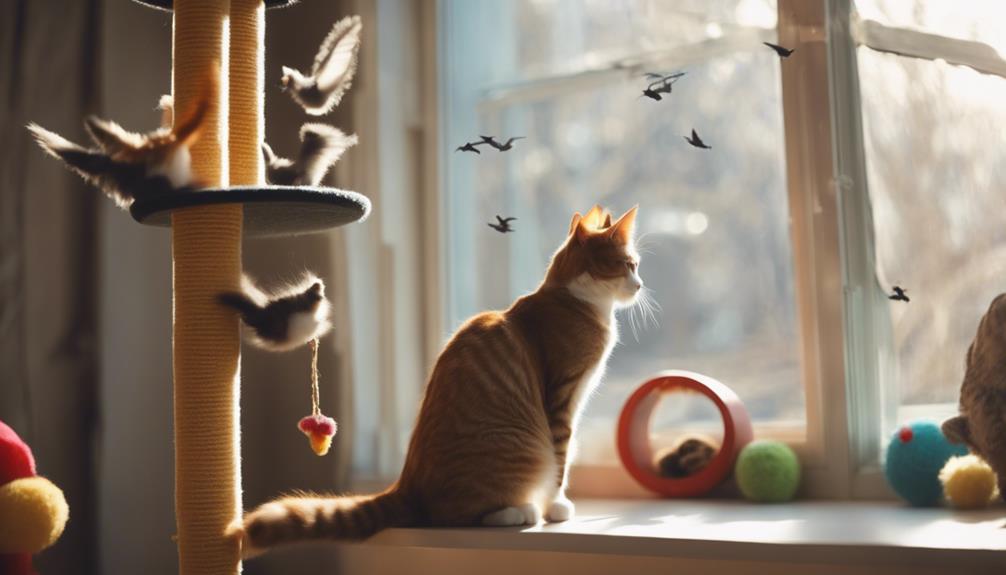
Indoor cats may miss out on natural socialization opportunities that outdoor cats have, making it essential for their owners to create opportunities for social interaction. This can include playing with your cat regularly, providing interactive toys, and engaging in activities that mimic natural behaviors, such as hunting and climbing.
Ensuring that your indoor cat has companionship, whether from humans or other animals, can also help prevent loneliness and boredom. Introducing a second cat or a compatible animal can provide much-needed social interaction for your feline friend. Additionally, creating a stimulating environment with vertical spaces, hiding spots, and puzzle toys can keep your indoor cat mentally engaged and satisfied.
Importance of Socialization for Indoor Cats
While some may debate the necessity of socialization for indoor cats, research consistently shows that it plays a crucial role in their overall well-being and behavior. Indoor cats rely on their environment for mental stimulation and enrichment activities. Socialization provides opportunities for bonding and establishing playtime routines that are essential for their physical and emotional health. Engaging in interactive play sessions with their owners or other pets can prevent boredom, reduce stress, and improve their quality of life.
Through socialization, cats can develop crucial social skills, build confidence, and decrease the likelihood of developing behavioral issues such as aggression or excessive grooming. Creating a stimulating environment with enriching activities can enhance their cognitive abilities and prevent feelings of loneliness or isolation. Therefore, it's vital for indoor cats to have regular socialization opportunities to ensure they lead fulfilling and balanced lives.
Behavioral Benefits of Cat Socialization
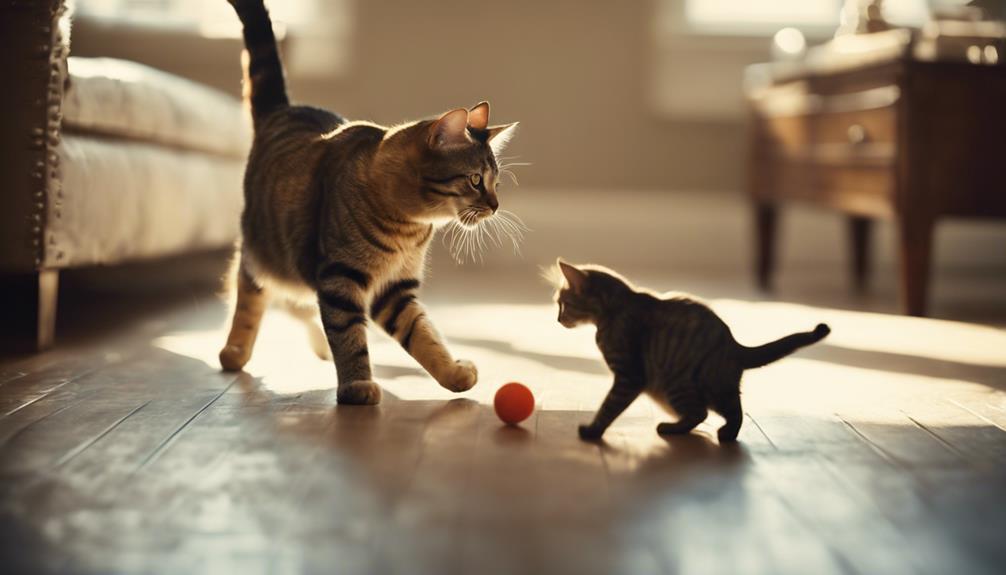
Socialization plays a pivotal role in shaping the behavioral patterns of indoor cats, contributing significantly to their overall well-being and quality of life. Through socialization, indoor cats can experience a range of behavioral benefits that enhance their daily lives:
- Enrichment activities: Socialization provides indoor cats with exposure to various enrichment activities such as interactive toys, puzzle feeders, and climbing structures. These activities help stimulate their minds, prevent boredom, and promote physical exercise.
- Bonding opportunities: Socializing indoor cats exposes them to bonding opportunities with humans and other pets. Building strong relationships can reduce stress and anxiety in cats, leading to a happier and more content feline companion.
- Mental stimulation: Interacting with different people, animals, and environments can offer mental stimulation for indoor cats. This stimulation can prevent behavioral issues like aggression or excessive grooming, keeping the cat's mind sharp and engaged.
Risks of Lack of Social Interaction
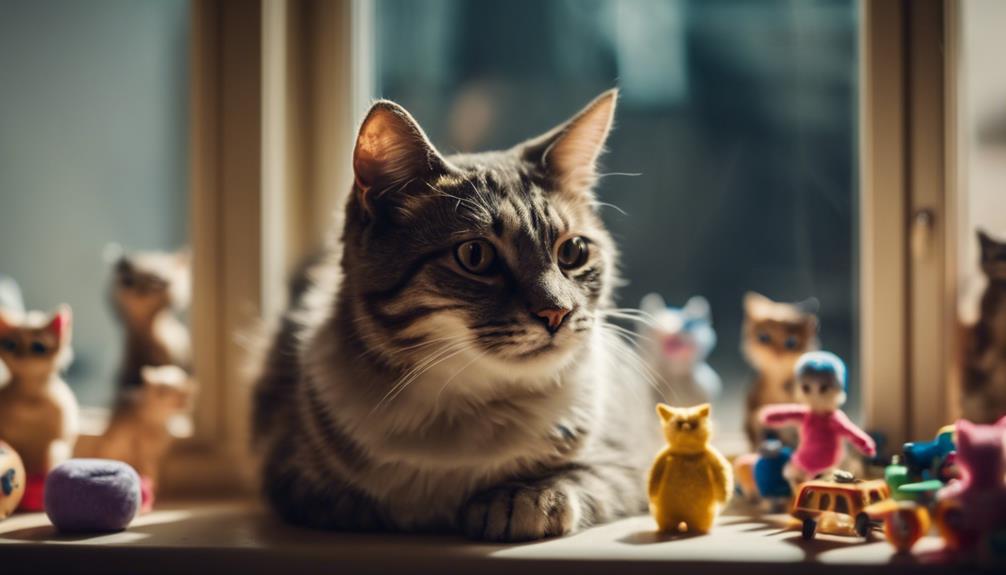
Lack of social interaction in indoor cats can have a significant impact on their well-being. Cats deprived of social experiences may exhibit behavioral issues such as aggression or excessive fear.
Furthermore, prolonged social isolation can lead to potential mental health consequences, affecting the overall quality of life for the cat.
Social Isolation Impact
Experiencing social isolation can have significant negative effects on the overall well-being of indoor cats. Lack of social interaction can lead to various issues that affect their mental health and quality of life. To mitigate these risks, here are three essential considerations:
- Behavioral Changes: Social isolation may cause cats to exhibit increased stress, anxiety, or depression-like symptoms, impacting their behavior and overall mental health.
- Physical Health Decline: Cats deprived of social interaction may experience a decline in physical health due to reduced exercise, weight gain, or even a weakened immune system.
- Developmental Challenges: Socially isolated cats may struggle with proper socialization skills, affecting their ability to interact with other pets or humans effectively.
Behavioral Issues Development
Social isolation in indoor cats can lead to the development of various behavioral issues that significantly impact their overall well-being and quality of life. Cats deprived of social interaction may exhibit behaviors such as aggression, excessive grooming, urine spraying, or even depression. To address these issues, interventions like play therapy and environmental enrichment can be beneficial. Play therapy involves interactive play sessions with toys or laser pointers to stimulate the cat's mind and body, reducing boredom and destructive behavior. Environmental enrichment focuses on creating a stimulating environment with scratching posts, climbing trees, and puzzle feeders to keep the cat mentally engaged. These approaches can help prevent and alleviate behavioral problems caused by social isolation.
| Play Therapy | Environmental Enrichment |
|---|---|
| Interactive play | Scratching posts |
| Mental stimulation | Climbing trees |
| Reduce boredom | Puzzle feeders |
Mental Health Consequences
The absence of regular social interactions can have detrimental effects on the mental health of indoor cats. Without adequate mental stimulation and enrichment activities, cats may experience feelings of loneliness and develop depression. These consequences can manifest in various ways, impacting the overall well-being of the feline companions.
To mitigate these risks, cat owners should prioritize activities that engage their pets' minds and provide social interaction opportunities. Here are three key considerations to support the mental health of indoor cats:
- Interactive Toys: Providing toys that encourage play and mental engagement can help combat feelings of loneliness and boredom.
- Scheduled Playtime: Setting aside dedicated time for interactive play sessions can enhance the cat's mental stimulation and prevent depressive behaviors.
- Environmental Enrichment: Creating a stimulating environment with climbing structures, hiding spots, and puzzle feeders can promote mental well-being.
Ways to Socialize Indoor Cats
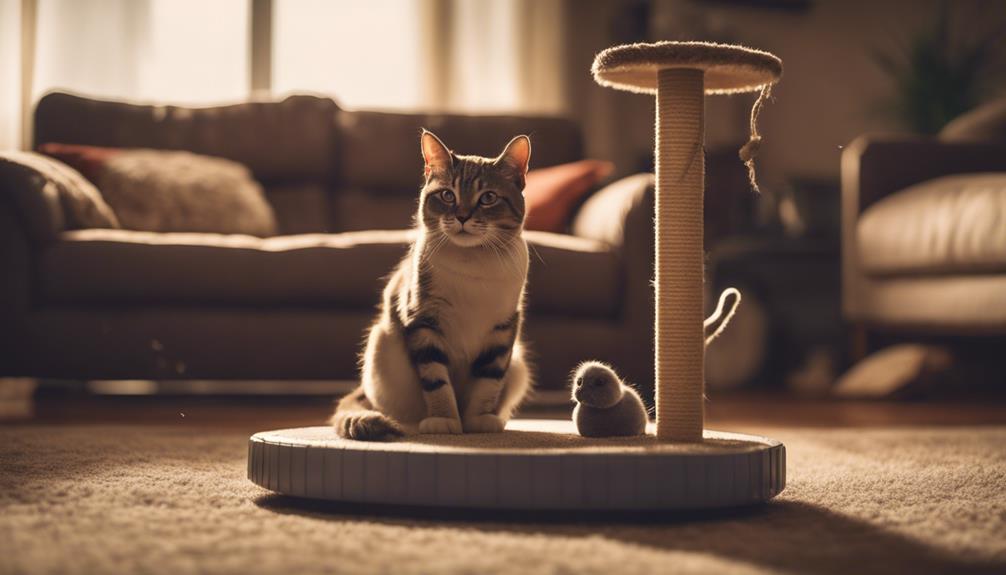
To help indoor cats adjust to social interactions, owners can gradually introduce them to new people and environments. One effective way to socialize indoor cats is through outdoor exploration under controlled conditions, such as a secure backyard or a catio. Outdoor exposure allows cats to engage their natural instincts, providing mental stimulation and physical exercise. Additionally, supervised outdoor time can help indoor cats become more comfortable with unfamiliar sights, sounds, and smells, aiding in their overall socialization.
Another method to socialize indoor cats is by fostering feline friendships. Introducing a new cat or arranging playdates with other friendly felines can promote positive social interactions and reduce feelings of loneliness or boredom. Cats are social creatures, and having a companion can greatly benefit their emotional well-being. However, introductions should be done gradually and carefully to ensure a smooth transition and prevent conflicts between the cats. By incorporating outdoor exploration and fostering feline friendships, owners can effectively socialize their indoor cats and enhance their overall quality of life.
Signs of Socialization Needs in Cats
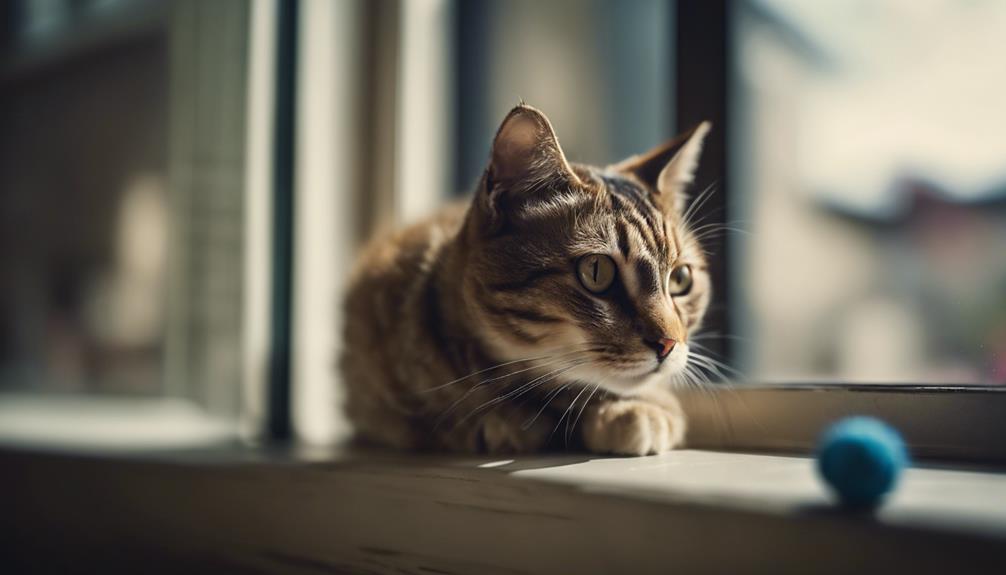
Recognizing signs of socialization needs in cats can help owners address their pets' behavioral and emotional well-being effectively. Cats, known for their independent nature, still require social interaction and mental stimulation for optimal health. Here are three key signs that indicate a cat may need more socialization:
- Lack of Bonding Opportunities: Cats are social animals that form strong bonds with their owners. If a cat is avoiding interactions, not seeking attention, or displaying aloof behavior, it could signal a lack of bonding opportunities. Providing regular one-on-one time, such as grooming sessions or interactive play, can strengthen the human-feline bond and fulfill the cat's social needs.
- Increased Anxiety: Cats experiencing socialization deficits may exhibit signs of anxiety, such as excessive hiding, aggression, or destructive behavior. Creating a safe and enriched environment with behavioral stimulation, like puzzle feeders or interactive toys, can help alleviate anxiety and provide mental enrichment.
- Withdrawn Behavior: Cats that aren't adequately socialized may become withdrawn, displaying behaviors like excessive sleeping, reduced playfulness, or a lack of curiosity. Encouraging positive social interactions and providing opportunities for mental stimulation can help prevent withdrawal and promote a happy, well-adjusted cat.
Balancing Solitude and Companionship
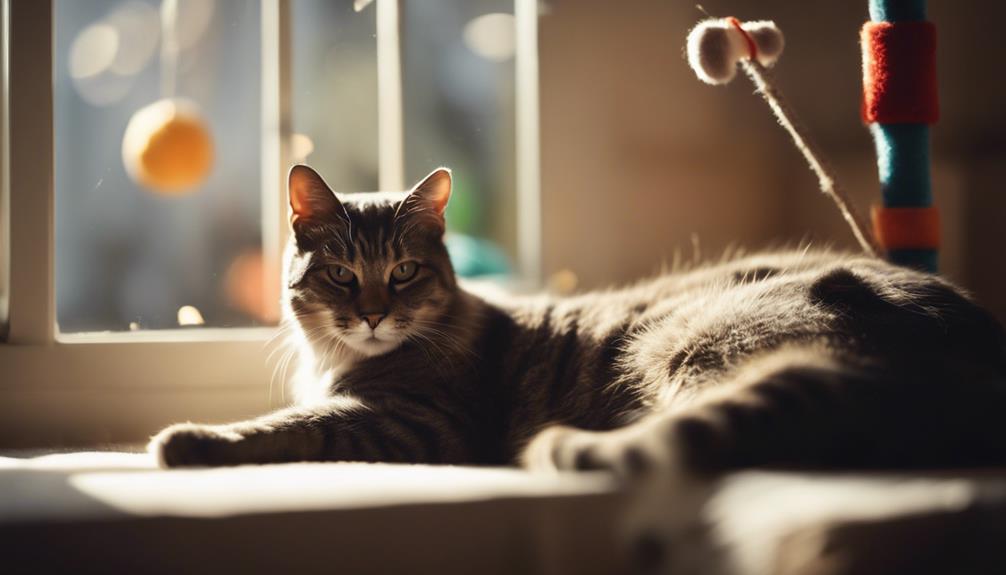
Balancing solitude and companionship in a cat's environment is essential for maintaining their mental well-being and overall happiness. Solitude management plays a crucial role in providing cats with the necessary space and time for relaxation and independent activities. Cats, known for their independent nature, require solitude to feel secure and in control of their surroundings. However, excessive solitude without companionship can lead to feelings of loneliness and boredom in cats.
To maintain a healthy companionship balance, cat owners should establish socialization boundaries that cater to their feline's individual needs. Understanding each cat's preferences and behaviors is key to creating an environment that promotes both solitude and companionship effectively. Providing interactive toys, vertical spaces for climbing, and safe outdoor access (if applicable) can offer opportunities for mental stimulation and physical activity while respecting a cat's independence.
Creating a Social Environment for Cats

Providing cat-friendly play areas and interactive toys can significantly enhance a cat's social environment.
These tools not only encourage physical activity but also stimulate their minds, promoting mental well-being.
Cat-Friendly Play Areas
Creating inviting play areas for cats in your home can significantly enhance their social environment and overall well-being. To create a cat-friendly play area, consider the following:
- Vertical Space Utilization: Cats love to climb and perch up high. Install cat trees, shelves, or window perches to provide vertical space for exploration and relaxation.
- Interactive Elements: Incorporate interactive toys, scratching posts, and puzzle feeders to engage your cat in playtime stimulation and mental exercise.
- Cozy Hideouts: Cats appreciate cozy, quiet spaces to retreat to when they need a break. Provide comfortable hideouts like cat caves or covered beds where they can relax and feel safe.
Interactive Toys for Enrichment
To enhance a cat's social environment and mental stimulation, incorporating interactive toys is essential. Interactive challenges and puzzle feeders are excellent tools to keep indoor cats engaged and mentally sharp.
Enrichment activities, such as playtime routines with interactive toys, provide opportunities for cats to exhibit their natural hunting instincts and curiosity. These toys not only offer physical exercise but also mental enrichment, preventing boredom and potential behavior issues in indoor cats.
Regular play sessions with interactive toys can strengthen the bond between cats and their owners, creating a more fulfilling social environment for the feline companions. By incorporating interactive toys into their daily routines, cat owners can ensure their pets lead happy and enriched lives.
Frequently Asked Questions
Can Indoor Cats Be Socialized Differently Than Outdoor Cats?
Indoor cats can be socialized differently than outdoor cats. By incorporating playtime routines and environmental enrichment, along with bonding activities and positive reinforcement techniques, indoor cats can thrive socially and mentally in their home environment.
Are There Specific Breeds of Cats That Require More Socialization Than Others?
Certain cat breeds, like Siamese or Maine Coons, may demand more socialization due to their inherent personalities. However, with proper training methods, any cat can adapt well. Neglecting socialization could lead to behavior issues down the road.
What Age Is Best to Start Socializing an Indoor Cat?
Starting socialization early benefits indoor cats. Techniques like positive reinforcement can help. Challenges may include fear or aggression. Consistent efforts from kittenhood can lead to well-adjusted, friendly cats.
How Can I Tell if My Indoor Cat Is Feeling Lonely or in Need of More Social Interaction?
To gauge a cat's loneliness or need for social interaction, observe behaviors like excessive meowing, lethargy, or destructive behavior. Providing interactive toys, engaging in bonding activities, or arranging play dates at cat cafes can help alleviate loneliness and promote socialization.
Can Indoor Cats Become Aggressive if They Lack Socialization?
Indoor cats may exhibit aggression due to lack of socialization. Behavior modification techniques and enrichment activities like interactive toys can help prevent aggression. Socialization plays a crucial role in a cat's overall well-being.











